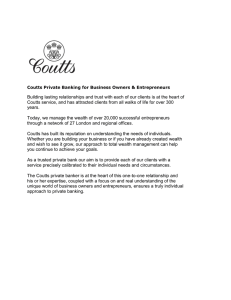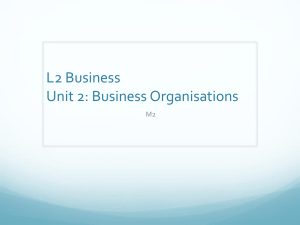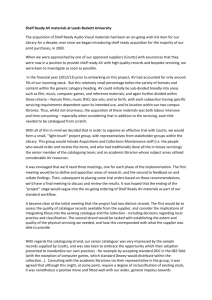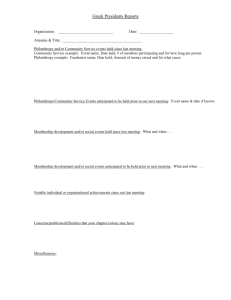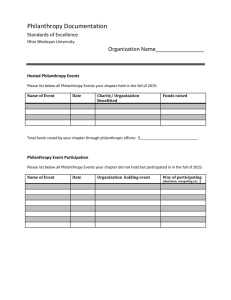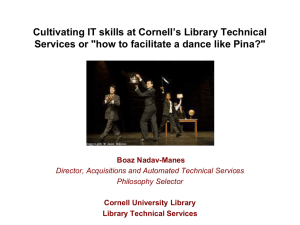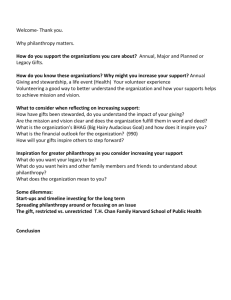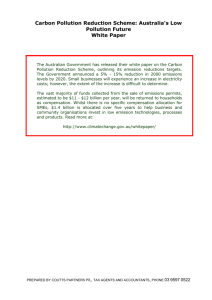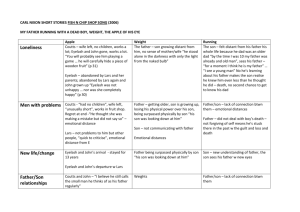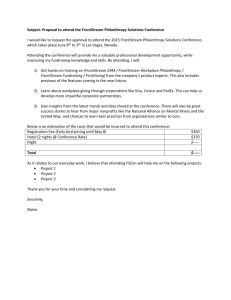a copy of this case study
advertisement
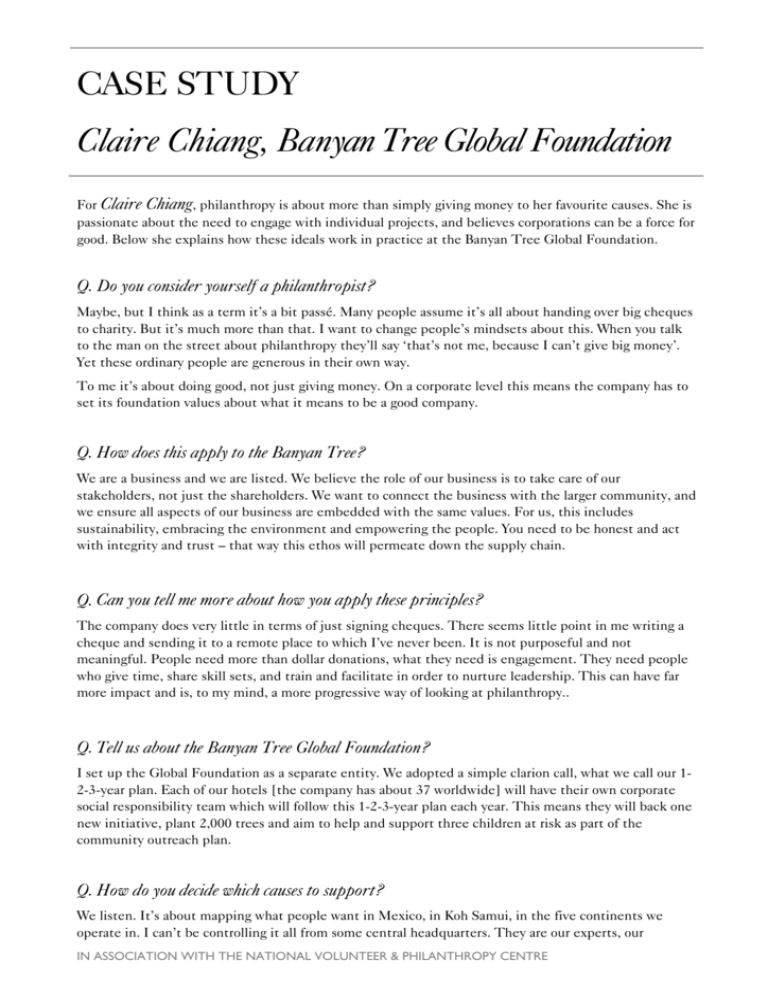
CASE STUDY Claire Chiang, Banyan Tree Global Foundation For Claire Chiang, philanthropy is about more than simply giving money to her favourite causes. She is passionate about the need to engage with individual projects, and believes corporations can be a force for good. Below she explains how these ideals work in practice at the Banyan Tree Global Foundation. Q. Do you consider yourself a philanthropist? Maybe, but I think as a term it’s a bit passé. Many people assume it’s all about handing over big cheques to charity. But it’s much more than that. I want to change people’s mindsets about this. When you talk to the man on the street about philanthropy they’ll say ‘that’s not me, because I can’t give big money’. Yet these ordinary people are generous in their own way. To me it’s about doing good, not just giving money. On a corporate level this means the company has to set its foundation values about what it means to be a good company. Q. How does this apply to the Banyan Tree? We are a business and we are listed. We believe the role of our business is to take care of our stakeholders, not just the shareholders. We want to connect the business with the larger community, and we ensure all aspects of our business are embedded with the same values. For us, this includes sustainability, embracing the environment and empowering the people. You need to be honest and act with integrity and trust – that way this ethos will permeate down the supply chain. Q. Can you tell me more about how you apply these principles? The company does very little in terms of just signing cheques. There seems little point in me writing a cheque and sending it to a remote place to which I’ve never been. It is not purposeful and not meaningful. People need more than dollar donations, what they need is engagement. They need people who give time, share skill sets, and train and facilitate in order to nurture leadership. This can have far more impact and is, to my mind, a more progressive way of looking at philanthropy.. Q. Tell us about the Banyan Tree Global Foundation? I set up the Global Foundation as a separate entity. We adopted a simple clarion call, what we call our 12-3-year plan. Each of our hotels [the company has about 37 worldwide] will have their own corporate social responsibility team which will follow this 1-2-3-year plan each year. This means they will back one new initiative, plant 2,000 trees and aim to help and support three children at risk as part of the community outreach plan. Q. How do you decide which causes to support? We listen. It’s about mapping what people want in Mexico, in Koh Samui, in the five continents we operate in. I can’t be controlling it all from some central headquarters. They are our experts, our IN ASSOCIATION WITH THE NATIONAL VOLUNTEER & PHILANTHROPY CENTRE Coutts Million Dollar Donors Report 2014 CASE STUDY: CLAIRE CHIANG champions. They tell us what they want to do. We then set up a checklist and discuss the pros and cons of supporting these different schemes. We want to know how helpful it is, how many people will benefit, whether these projects can grow and what their final outcome will be. It is important for us to assess the social and economic impact of our support programmes. Q. Can you give me an example? Some projects might improve literacy in children, others may teach them to swim so fewer children drown. It can be about enhancing their understanding of herbs so they can plant them to make aromatic oils – that’s what many families in Vietnam do. These plants are free so they pick them and compress them into fantastic oils and skin creams to sell on the street. There might be the opportunity to set up a cooperative, build a factory, develop a social enterprise, and export these oils overseas for example. But we aren’t just looking to steer this from the outside. It has to be a local champion who can see this possibility that we might look to nurture. It takes time though. This is what I mean by engagement and combining for-profit ventures with non-profit goals. Q. How do you measure success? There have to be twin pillars for success: competition and care. I don’t just look at wealth creation in terms of dollars, I look at value creation and I think this enables companies to sustain long-term success. You don’t pour polluted water into the drain, for example, you build a proper sewerage facility. This might cost in the short term, but it’s a longer-term investment for me because it is about sustainability. Q. How do you encourage those in your business to follow these ideals? It can’t be imposed from the top. This isn’t something we do in addition to our main job, it’s a central part of the way we operate. It is part of people’s training. The values are embedded and everyone is involved: hotel general managers, heads of departments, supervisors, trainers and so on. We employ people in different countries, from different backgrounds, but what holds us together is a shared ethos. Q. How has your approach been influenced by your own experiences? I grew up in Little India, Singapore with very little. I learnt to be resourceful with what you have – as we used to say, ‘less is more’. My mother taught us to bring food to neighbours and they would then return this kindness when it was needed. There were other lessons: my father was an accountant and kept the books for neighbours who couldn’t speak a word of Chinese or English. He taught me about accountability, responsibility, integrity and honesty. Doing good is really about having a set of values and ideas. I’m simply translating a set of values and ideas that I grew up with. People ask me when I starting doing corporate social responsibility (CSR) at the Banyan Tree. I tell them we didn’t used to call it this, but we’ve had these values from day one. IN ASSOCIATION WITH THE NATIONAL VOLUNTEER & PHILANTHROPY CENTRE Coutts Million Dollar Donors Report 2014 CASE STUDY: CLAIRE CHIANG Q. How did it all start? We bought an abandoned tin mine. It was thought that it couldn’t be developed because the top soil was toxic. But we persevered, got the scientists in, changed the top soil and converted it, until it was no longer a blight on its local environment but a thriving integrated resort, the Laguna Phuket. In 1992 it won the American Express environmental award. So we started doing good without knowing the terminology of CSR, but the principles behind it were always there. Q. Is collaboration important? Yes, but it can be difficult. If people join forces with other corporate foundations, they can create a bigger impact and reach out to more people. But sometimes others can get too concerned about which corporate name appears on the banner. I think we can work with others who share our mindset, become friends, partners and advocates of these causes. Q. Do you work with many other organisations? Yes, we worked with many local NGOs (non-governmental not-for-profit organisations). We have also worked with the UN, building homes in the Maldives after the tsunami. There were a few companies coming together and the United Nations Development Programme (UNDP) was the co-ordinating leader. We all contributed money and time. We had staff helping to build 77 houses. It helped build a sense of togetherness and had a very positive impact. Q. What are the challenges for philanthropic organisations in Singapore? I think in Singapore we are very good at knowing the facts and spelling out the KPIs (key performance indicators). But we aren’t always so good at guiding people from A to B. Nurturing, mentoring, facilitating are an important part of this engagement. Unfortunately, we don’t often have the patience for this, because it does take time. It takes a certain kind of charisma to take people from where they are – which might be sceptical and resistant – and to try and change this mindset. It takes a good coach and a lot of time, and we are not so good at that. We don’t coach people. We scold. We mark people and judge them. We need to concentrate more on coaching and nurturing. Q. What advice would you give to corporations looking to set up their own foundations? Do it. Setting up a foundation is like continuing a legacy, it will enable your own values to live on. Disclaimer This document is produced by Coutts Institute and does not constitute financial research nor does it specify Coutts products and services. This document is for information purposes only. Organisations noted in this document are not endorsed by Coutts and the document does not constitute recommendations for funding or investment. Any risks associated with supporting or investing in organisations noted in this document are the individual’s own. Coutts does not receive a commission or payment in any form from any organisation noted in this document. Nothing in this document constitutes investment, legal, financial, accounting or tax advice and does not confirm that a representative of strategy is suitable or appropriate to your individual circumstances or otherwise constitute a personal recommendation to you. Philanthropists should seek independent tax and legal advice regarding tax and legal effectiveness of their philanthropy proposition. This document contains the addresses of websites that are not operated or monitored by Coutts. Should you activate such links, you enter such websites at your own risk. Coutts has not reviewed such websites and does not accept liability for their content, the products or services offered or any other offers. The views and opinions expressed in these websites are those of the website authors and are not necessarily shared by Coutts. Although the information herein has been obtained from sources believed to be reliable, Coutts and its affiliates do not guarantee its accuracy, completeness or fairness. To the extent permitted by law and any applicable regulation, neither Coutts nor its affiliates accepts responsibility for any direct, indirect or consequential loss suffered by you or any other person as a result of your or their acting or deciding not to act, in reliance upon such information, opinions and analysis. © Coutts & Co 2014 IN ASSOCIATION WITH THE NATIONAL VOLUNTEER & PHILANTHROPY CENTRE
